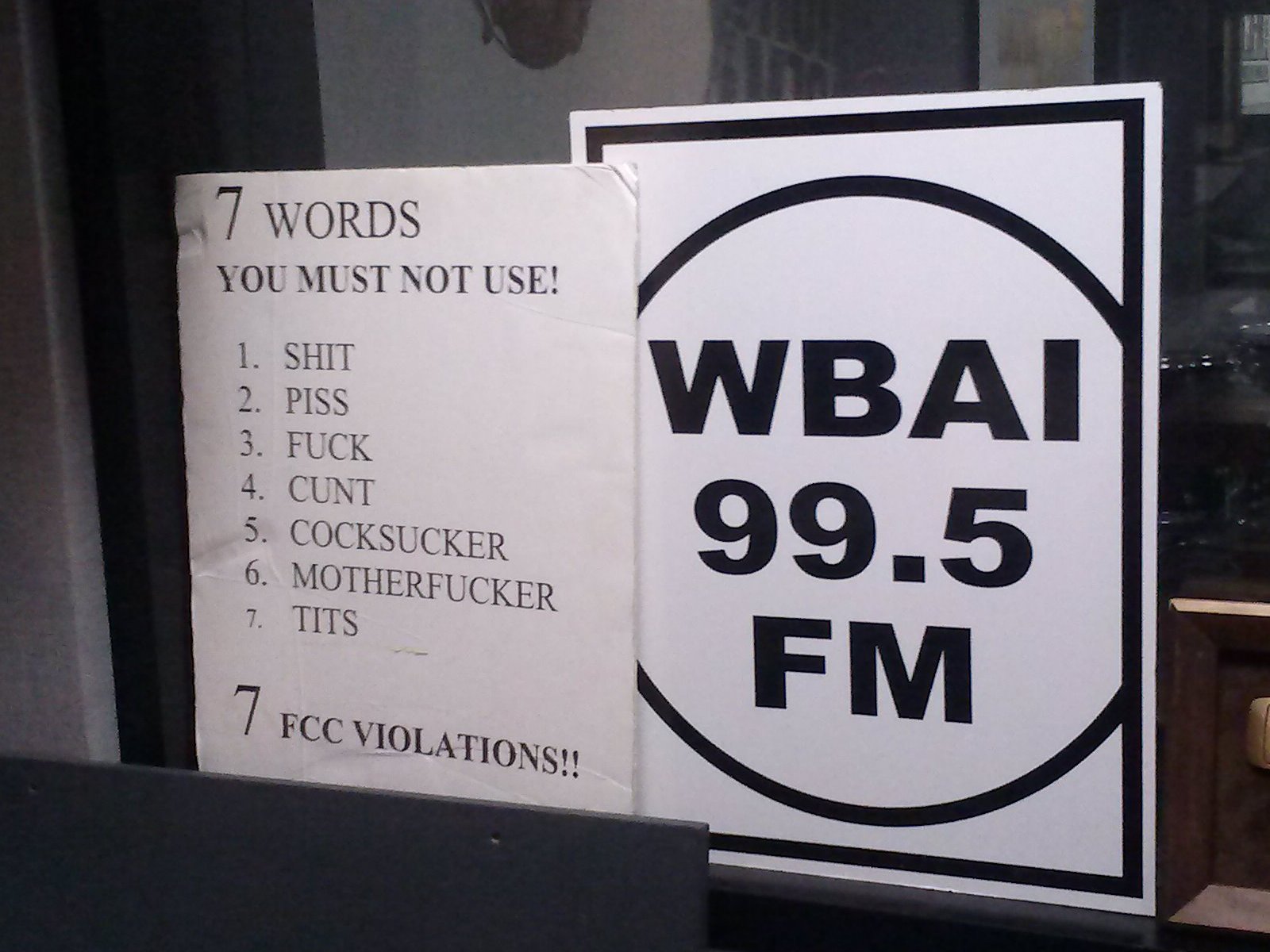Federal Communications Commission v. Pacifica Foundation on:
[Wikipedia]
[Google]
[Amazon]
''Federal Communications Commission v. Pacifica Foundation'', 438 U.S. 726 (1978), was a landmark decision of the US Supreme Court that defined the power of the

Federal Communications Commission
The Federal Communications Commission (FCC) is an independent agency of the United States federal government that regulates communications by radio, television, wire, satellite, and cable across the United States. The FCC maintains jurisd ...
(FCC) over indecent
Inappropriateness refers to standards or ethics that are typically viewed as being negative in a society. It differs from things that are illicit in that inappropriate behavior does not necessarily have any accompanying legal ramifications.
Co ...
material as applied to broadcasting.
Facts
On October 30, 1973, FM radio station WBAI in New York City aired a broadcast that included a segment which featured the George Carlin routine " Filthy Words" as part of a program about societal attitudes toward language. A few weeks later, John Douglas (an active member of Morality in Media) stated in a complaint filed with theFederal Communications Commission
The Federal Communications Commission (FCC) is an independent agency of the United States federal government that regulates communications by radio, television, wire, satellite, and cable across the United States. The FCC maintains jurisd ...
(FCC) that he heard the broadcast while he was driving with his 15-year-old son. He also stated the material was inappropriate for the time of day (approximately 2:00 p.m.). In response, the Pacifica Foundation (owner of WBAI) received a letter of reprimand from the FCC, censuring them for allegedly violating broadcast regulations which prohibited airing indecent material.

Holding
The U.S. Supreme Court upheld the FCC's actions in 1978, by a vote of 5 to 4, ruling that the routine was "indecent but not obscene". The Court recognized the government had strong interests in: * Shielding children from potentially offensive material, and * Ensuring that unwanted speech does not intrude on the privacy of one's home. The ''Pacifica'' Court upheld the FCC's power to regulate broadcast media, citing two pervading governmental interests. First, the “uniquely pervasive” nature of these broadcasts allows them to seep into “the privacy of the home” without the consent of the viewer. Second, broadcasts are “uniquely accessible to children” whose “vocabularyould be enlarged Ould is an English surname and an Arabic name ( ar, ولد). In some Arabic dialects, particularly Hassaniya Arabic, ولد (the patronymic, meaning "son of") is transliterated as Ould. Most Mauritanians have patronymic surnames.
Notable ...
in an instant” by hearing indecent or profane language. The Court held that these two concerns were sufficient to “justify special treatment of indecent broadcasting,” thereby allowing the FCC to fine broadcasters for airing inappropriate content.
The Court stated that the FCC had the authority to prohibit such broadcasts during hours when children were likely to be among the audience, and gave the FCC broad leeway to determine what constituted indecency in different contexts.
Impact
At first, despite the resounding win in ''Pacifica'', the FCC used its new regulatory powers sparingly. In the 1990s, however, the FCC ramped up sanctions for indecent broadcasts. By the early 2000s, the FCC began to levy more sanctions with higher dollar amounts—with fines of up to $500,000 for some offenses. In 1997, Pacifica Radio "Living Room" host Larry Bensky prefaced an interview with Carlin by saying: "George Carlin, you're a very unusual guest for Pacifica Radio. You're probably the only person in the United States that we don't have to give The Carlin Warning to about which words you can't say on this program, because it's named after you." In 1996, Congress passed the Communications Decency Act, which criminalized the knowing transmission of "obscene or indecent" messages to underage people on the Internet. In ''Reno v. American Civil Liberties Union
''Reno v. American Civil Liberties Union'', 521 U.S. 844 (1997), was a landmark decision of the Supreme Court of the United States, unanimously ruling that anti-indecency provisions of the 1996 Communications Decency Act violated the First Amendme ...
'' (1997), the American Civil Liberties Union
The American Civil Liberties Union (ACLU) is a nonprofit organization founded in 1920 "to defend and preserve the individual rights and liberties guaranteed to every person in this country by the Constitution and laws of the United States". ...
claimed that the act violated First Amendment's guarantee of freedom of speech for adult Internet users. To attain standing, the ACLU published the Supreme Court's opinion on ''F.C.C. v. Pacifica Foundation'' on its website, which included a transcript of Carlin's monologue.
See also
* List of United States Supreme Court cases, volume 438 * ''Federal Communications Commission v. Fox Television Stations'' (2009) * ''Federal Communications Commission v. Fox Television Stations'' (2012) * '' Miller v. California'' 413 U.S. 15 (1973).References
Further reading
*External links
* * * {{DEFAULTSORT:Federal Communications Commission V. Pacifica Foundation Censorship of broadcasting in the United States Obscenity law Federal Communications Commission litigation Pacifica Foundation United States Supreme Court cases United States Supreme Court cases of the Burger Court United States Free Speech Clause case law 1978 in United States case law Media case law History of radio 1978 in radio George Carlin